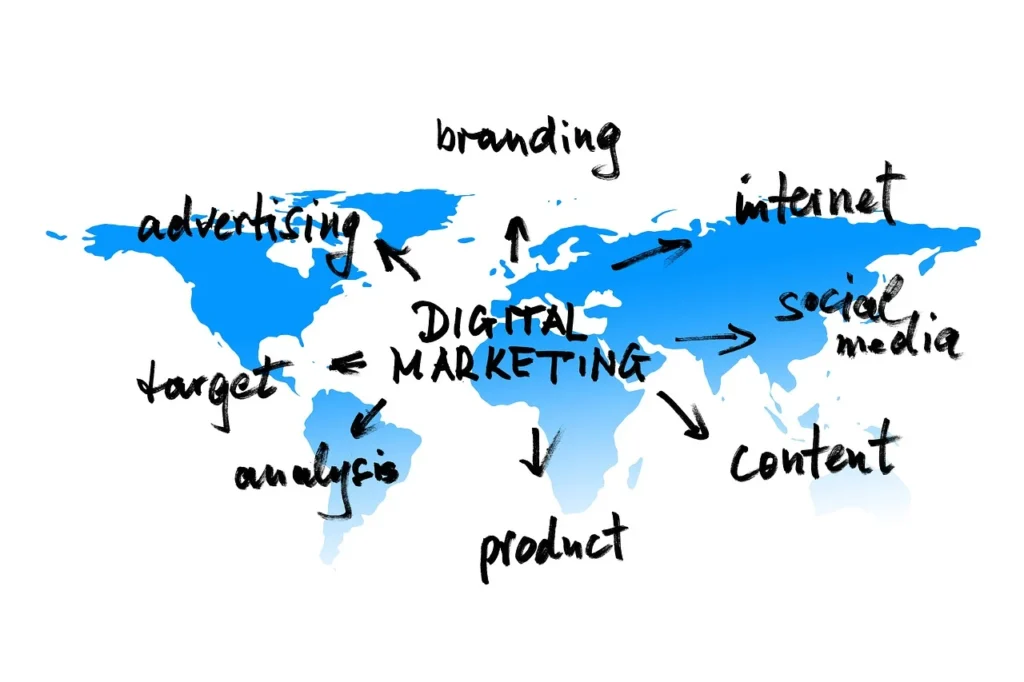Introduction
Table of Contents
What is Digital Marketing
Digital marketing uses channels, platforms, and strategies to promote products or services to a target audience. These digital platforms include websites, social media, search engines, email, and mobile apps. In contrast to traditional marketing methods like print ads or billboards, digital marketing focuses on reaching consumers through online platforms where they spend much of their time. With the ever-increasing internet usage, digital marketing has become an essential part of any business strategy, whether for startups or well-established brands.

Why is Digital Marketing Essential in Today’s World?
In a world where billions of people use the internet daily, businesses must have an online presence to stay competitive. Consumers today rely on online research before making purchasing decisions, whether looking for a product review, searching for the best deal, or trying to find a local business. Therefore, companies that harness digital marketing have a significant edge in capturing this online audience and converting them into customers.
Digital Marketing of Importance
How Digital Marketing Differs from Traditional Marketing
Traditional marketing methods, such as print ads, TV commercials, or direct mail, are still effective, but they often require significant investment and reach a limited audience. Digital marketing, on the other hand, is highly scalable, cost-effective, and offers a much broader reach. It enables businesses to target specific demographics, track performance metrics, and adjust real-time strategies. This ability to personalize content and measure performance sets digital marketing apart from traditional approaches.
Why Businesses Need Digital Marketing
In today’s competitive landscape, digital marketing is not optional but necessary. Whether you’re a small business owner or a large corporation, a digital presence helps in customer acquisition, retention, and brand building. Without digital marketing, businesses risk losing visibility, customer engagement, and, ultimately, revenue to competitors who have embraced online marketing.
Key Components of Digital Marketing
Search Engine Optimization
Improving your website to appear higher on search engine results pages (SERPs) is known as search engine optimization or SEO. You want your website to show up as high in search results as possible when someone is looking for a product or service linked to your company to increase traffic.
Importance of SEO
SEO helps businesses gain organic visibility, leading to more website traffic and potential customers. Higher visibility also establishes credibility and trust with consumers.
On-Page Optimization:
Focuses on optimizing individual pages through keywords, meta descriptions, title tags, and quality content.
Off-Page Optimization:
Involves building backlinks from other reputable sites and engaging with your audience through social media and guest posts.
Content Marketing
Content marketing is the process of producing and sharing useful, pertinent content to draw in and captivate a specific audience. This content may include blog articles, infographics, videos, e-books, and additional formats.
Why Content Marketing is Important:
Content marketing builds brand awareness, educates your audience, and nurtures customer relationships. High-quality content also improves SEO, leading to better visibility in search engines.
Examples of Content Marketing:
Blog articles that solve common customer problems, engaging social media posts, informative videos, and case studies.
Social Media Marketing (SMM)
Social media marketing uses platforms like Facebook, Instagram, Twitter, and LinkedIn to promote your brand and engage with your audience.
Organic vs. Paid Strategies:
Organic social media involves building an audience through regular, unpaid posts, while paid strategies involve boosting posts or running ads to target specific demographics.
Benefits of Social Media Marketing:
Social media allows brands to build personal connections with their audience, increase brand loyalty, and drive traffic to their website.
Email Promotions
Email promotions are one of the venerable yet most potent digital promotional tactics. I
Why Email Marketing Works:
It’s a direct line to your audience and offers a high return on investment (ROI). Personalized email campaigns can nurture leads, drive sales, and encourage repeat business.
Pay-Per-Click (PPC) Advertising
PPC is an advertising model where businesses pay for each click on their ad. Google Ads and Facebook Ads are the prevailing channels for Pay-Per-Click advertising initiatives.
How Businesses Benefit from PPC
PPC allows businesses to target specific keywords and demographics, ensuring relevant audiences see their ads. Unlike SEO, PPC generates immediate visibility, although it requires continuous investment.
Affiliate Marketing
Affiliate marketing is a performance-based marketing strategy where businesses partner with affiliates who promote their products in exchange for a commission on sales generated.
Examples of Affiliate Marketing:
Many bloggers, influencers, and websites promote products from platforms like Amazon through affiliate links, earning a percentage of the sale for every customer they refer.
Influencer Marketing
Influencer marketing is about working with people with a big audience on social media to advertise products or services.
Successful Campaign
Brands partner with influencers who align with their values and target audience. For example, fashion brands often work with popular Instagram influencers to promote their latest collection
Benefits of Digital Marketing
Cost-Effectiveness
Compared to traditional advertising methods, digital marketing is far more affordable. Small businesses, in particular, benefit from the lower costs and flexibility to scale campaigns according to their budget.
Global Reach
One of the greatest advantages of digital marketing is its ability to reach a global audience. A small business can use online platforms to target customers across different countries without needing a physical presence in those locations.
Measurable Results
With digital marketing, businesses can track every interaction and campaign performance using tools like Google Analytics. This data-driven approach helps marketers optimize their strategies and ensure their efforts generate results.
Targeted Advertising
Digital marketing platforms offer sophisticated targeting options, allowing businesses to tailor their ads to specific demographics, interests, and behaviours. This approach guarantees that the money spent on marketing is used efficiently.
Trends in Digital Marketing
The Role of AI and Automation
to learn more about us click here https://yoursdigitalmarketing.com/blog/

